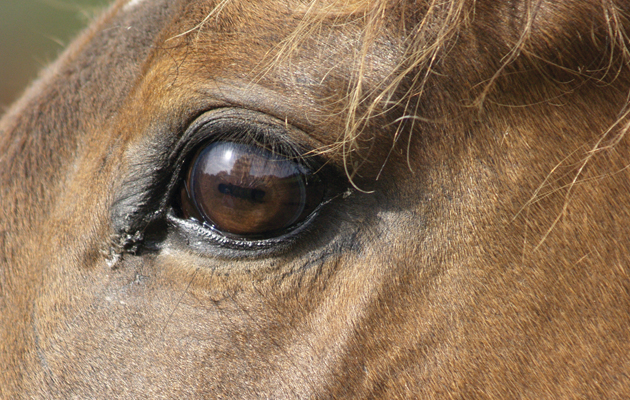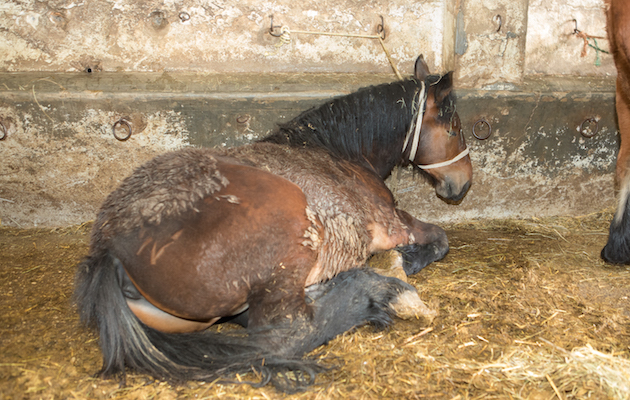The RSPCA organised a “lead the debate” session on 19 August. A panel comprising experts in the field discussed the equine crisis and its potential worsening in the event of another recession. H&H was represented on the panel and reports on the debate
THE race is far from over, and the equestrian industry has a collective responsibility to end what can no longer be called a horse crisis.
This was the message from the first “lead the debate” session organised by the RSPCA, on 19 August. A panel comprising journalist and newsreader Victoria Derbyshire, Dragons’ Den star and horse owner Deborah Meaden, RSPCA CEO Chris Sherwood, National Equine Welfare Council (NEWC) chair and Redwings head of behaviour and welfare Nicolas de Brauwere, Elise Pilkington Charitable Trust trustee and World Horse Welfare chief field officer Claire Gordon and RSPCA inspector Kirsty Withnall, as well as representation of H&H, discussed the equine crisis and its potential worsening in the event of another recession.
{"content":"PHA+VGhlIHNwZWFrZXJzIGFncmVlZCB0aGF0IHdpdGggY2hhcml0aWVzIGF0IGNhcGFjaXR5IGFuZCB0aGUgbnVtYmVycyBvZiBob3JzZXMgaW4gcmVwb3J0ZWQgd2VsZmFyZSBpbmNpZGVudHMgaW5jcmVhc2luZywgYWN0aW9uIGhhcyB0byBiZSBvbiBwcmV2ZW50aW9uIHJhdGhlciB0aGFuIGN1cmUsIGFuZCBjaGFuZ2luZyBodW1hbiBiZWhhdmlvdXIsIGFuZCB0aGF0IGl0IGlzIGEgY29sbGVjdGl2ZSByZXNwb25zaWJpbGl0eS48L3A+CjxwPuKAnEF0IHRoZSBoZWFydCBvZiBhbnkgY2FtcGFpZ24gb3IgcHJldmVudGlvbiB3ZSBkbyBoYXMgdG8gYmUgdGhlIHBvaW50IHRoYXQgZXZlcnkgZXF1aW5lIGlzIGEgc2VudGllbnQgYmVpbmcsIHRoYXQgaGFzIGZlZWxpbmdzIGFuZCBhIHNldCBvZiB3ZWxmYXJlIG5lZWRzLCBhbmQgZXZlcnkgZXF1aW5lIGRlc2VydmVzIGFuZCBhYnNvbHV0ZWx5IHNob3VsZCBoYXZlIGEgZ29vZCBsaWZlLOKAnSBNciBTaGVyd29vZCBzYWlkLiDigJxBbGwgdG9vIG9mdGVuIHRoZXkgaGF2ZW7igJl0IGhhZCB0aGF0IGZpcnN0IGNoYW5jZSwgYW5kIG91ciB3b3JrIGlzIHRvIGdpdmUgdGhlbSBhIHNlY29uZCBvbmUuPC9wPgo8cD7igJxXZSBjYW7igJl0IGtlZXAgY2hhc2luZyB0aGUgYW1idWxhbmNlIHdpdGggdGhlIGhvcnNlIGluIGl0OyB3ZeKAmXZlIGdvdCB0byBnZXQgYWhlYWQgb2YgdGhlIHByb2JsZW0u4oCdPC9wPgo8cD48ZGl2IGNsYXNzPSJhZC1jb250YWluZXIgYWQtY29udGFpbmVyLS1tb2JpbGUiPjxkaXYgaWQ9InBvc3QtaW5saW5lLTIiIGNsYXNzPSJpcGMtYWR2ZXJ0Ij48L2Rpdj48L2Rpdj48c2VjdGlvbiBpZD0iZW1iZWRfY29kZS0zMSIgY2xhc3M9ImhpZGRlbi1tZCBoaWRkZW4tbGcgcy1jb250YWluZXIgc3RpY2t5LWFuY2hvciBoaWRlLXdpZGdldC10aXRsZSB3aWRnZXRfZW1iZWRfY29kZSBwcmVtaXVtX2lubGluZV8yIj48c2VjdGlvbiBjbGFzcz0icy1jb250YWluZXIgbGlzdGluZy0tc2luZ2xlIGxpc3RpbmctLXNpbmdsZS1zaGFyZXRocm91Z2ggaW1hZ2UtYXNwZWN0LWxhbmRzY2FwZSBkZWZhdWx0IHNoYXJldGhyb3VnaC1hZCBzaGFyZXRocm91Z2gtYWQtaGlkZGVuIj4NCiAgPGRpdiBjbGFzcz0icy1jb250YWluZXJfX2lubmVyIj4NCiAgICA8dWw+DQogICAgICA8bGkgaWQ9Im5hdGl2ZS1jb250ZW50LW1vYmlsZSIgY2xhc3M9Imxpc3RpbmctaXRlbSI+DQogICAgICA8L2xpPg0KICAgIDwvdWw+DQogIDwvZGl2Pg0KPC9zZWN0aW9uPjwvc2VjdGlvbj48L3A+CjxwPk1zIERlcmJ5c2hpcmUgaGFkIGludHJvZHVjZWQgdGhlIGRlYmF0ZSBieSBleHBsYWluaW5nIHRoYXQgdGhlIDIwMDggZmluYW5jaWFsIGNyYXNoIGhhZCBsZWQgdG8gdGhlIGVxdWluZSBjcmlzaXMsIGFuZCB0aGF0IHRoZSBSU1BDQSBpcyBhbW9uZyB0aG9zZSBleHBlY3RpbmcgdGhlIHNpdHVhdGlvbiB0byB3b3JzZW4gYXMgd2UgZW1lcmdlIGZyb20gdGhlIGNvcm9uYXZpcnVzIHBhbmRlbWljLjwvcD4KPHA+4oCcV2XigJl2ZSBnb3QgdG8gZ2V0IGFoZWFkIG9mIHRoaXMgY3Jpc2lzOyB3ZeKAmXZlIGdvdCB0byBlbmQgaXQs4oCdIE1yIFNoZXJ3b29kIHNhaWQsIGFkZGluZyB0aGF0IHRoZSBzaXR1YXRpb24gYWxyZWFkeSBjb3N0cyB0aGUgUlNQQ0EgbWlsbGlvbnMgYSB5ZWFyLCBhbmQgdGhhdCB0aGlzIGlzIG5vdCBzdXN0YWluYWJsZS48L3A+CjxwPuKAnFRvIGRvIHRoYXQsIHdlIGhhdmUgdG8gdW5kZXJzdGFuZCBpdCwgYW5kIGxvb2sgYXQgaG93IHdlIHdvcmsgdG9nZXRoZXIgYXMgYSBzZWN0b3IsIHdoYXQgbmVlZHMgdG8gY2hhbmdlLCBhbmQgd2hv4oCZcyByZXNwb25zaWJsZS48L3A+CjxkaXYgY2xhc3M9ImFkLWNvbnRhaW5lciBhZC1jb250YWluZXItLW1vYmlsZSI+PGRpdiBpZD0icG9zdC1pbmxpbmUtMyIgY2xhc3M9ImlwYy1hZHZlcnQiPjwvZGl2PjwvZGl2Pgo8cD7igJxUaGVyZSBhcmUgc29tZSBiaWcgYW5kIGRpZmZpY3VsdCBxdWVzdGlvbnMgdG8gYW5zd2VyLCBhbmQgdGhpcyBpcyB0aGUgdGltZSB0byBmYWNlIHVwIHRvIHRoZW07IGlmIHdlIGRvbuKAmXQsIHRoZXnigJlyZSBvbmx5IGdvaW5nIHRvIGdldCBtb3JlIGRpZmZpY3VsdC7igJ08L3A+CjxwPk1yIFNoZXJ3b29kIHNhaWQgY29sbGFib3JhdGlvbiBiZXR3ZWVuIGRpZmZlcmVudCBib2RpZXMgaXMga2V5IGFuZCB0aGF0IHRoaXMgaXMgaW1wcm92aW5nLCBidXQgaXQgd2lsbCBiZSBuZWVkZWQgdG8gYWN0IG9uY2UgdGhlIHJvb3QgY2F1c2VzIG9mIHRoZSBjcmlzaXMgYXJlIGJldHRlciB1bmRlcnN0b29kLjwvcD4KPGRpdiBjbGFzcz0iYWQtY29udGFpbmVyIGFkLWNvbnRhaW5lci0tbW9iaWxlIj48ZGl2IGlkPSJwb3N0LWlubGluZS00IiBjbGFzcz0iaXBjLWFkdmVydCI+PC9kaXY+PC9kaXY+CjxwPk1zIEdvcmRvbiBzYWlkLCBhcyBXb3JsZCBIb3JzZSBXZWxmYXJlIENFTyBSb2x5IE93ZXJzIGhhcyBwcmV2aW91c2x5LCB0aGF0IHRoZSBjcmlzaXMgY2Fubm90IGJlIGNhbGxlZCBzdWNoIGFueSBtb3JlLjxiciAvPgrigJxBIGNyaXNpcyBpcyBhIG1vbWVudCBpbiB0aW1lLCBhbmQgd2XigJl2ZSBiZWVuIGluIHRoaXMgYXQgbGVhc3QgMTAgeWVhcnMs4oCdIHNoZSBzYWlkLiDigJxUaGUgcHJvYmxlbSBhcmUgc3lzdGVtaWMsIGFuZCB3ZSBuZWVkIHRvIGxvb2sgYXQgd2hlcmUgd2XigJlyZSBmYWlsaW5nIGhvcnNlcywgdG8gdHJ5IHRvIHN0YXJ0IGZpeGluZyBpdC7igJ08L3A+CjxwPk1zIEdvcmRvbiBjaXRlZCBvdmVyLWJyZWVkaW5nIGFzIGEgY2F1c2UsIGFuZCB0aGUgaW1wb3J0YW5jZSBvZiBhIHJvYnVzdCBlcXVpbmUgSUQgc3lzdGVtIGluIG1hbmFnZW1lbnQsIGFzIG93bmVycyBtdXN0IGJlIGhlbGQgYWNjb3VudGFibGUuPC9wPgo8ZGl2IGNsYXNzPSJhZC1jb250YWluZXIgYWQtY29udGFpbmVyLS1tb2JpbGUiPjxkaXYgaWQ9InBvc3QtaW5saW5lLTUiIGNsYXNzPSJpcGMtYWR2ZXJ0Ij48L2Rpdj48L2Rpdj4KPHA+TXIgZGUgQnJhdXdlcmUgbGlrZW5lZCB0aGUgc2l0dWF0aW9uIHRvIHRoYXQgb2YgYSBiYXRoIGFzIHRoZSBjaGFyaXRpZXPigJkgY2FwYWNpdHksIGFuZCBob3JzZXMgcG91cmluZyBpbi4gQW5kIHdoaWxlIHRoZSBwbHVnaG9sZSByZXByZXNlbnRzIHJlaG9taW5nLCDigJx0aGUgYmF0aCBpcyBzdGlsbCBvdmVyZmxvd2luZywgYW5kIHdl4oCZcmUgdHJ5aW5nIHRvIGZpbmQgYSB3YXkgb2YgdHVybmluZyB0aGUgdGFwcyBvZmbigJ0uPC9wPgo8cD5IZSBhZ3JlZWQgd2l0aCBNcyBHb3Jkb24gdGhhdCB0aGUgcHJvYmxlbSBpcyBzeXN0ZW1pYywgd2l0aCByZWNlbnQgY2FsbHMgdHlwaWNhbGx5IGludm9sdmluZyA1MCwgNjAgb3IgbW9yZSBob3JzZXMsIGFuZCB0aGF0IOKAnGV2ZXJ5IGFyZWEgb2YgdGhlIHNlY3RvciBuZWVkcyB0byBkbyBpdHMgYml04oCdLjwvcD4KPHA+SGUgY2l0ZWQgdGhlIEFuaW1hbCBXZWxmYXJlIGFuZCBDb250cm9sIG9mIEhvcnNlcyBhY3RzIGFzIHBvd2VyZnVsIHRvb2xzLCBhbmQgdGhlIENlbnRyYWwgRXF1aW5lIERhdGFiYXNlLCBhbHRob3VnaCB0aGlzIGlzIHN0aWxsIGluIGl0cyBpbmZhbmN5IGFuZCBlbmZvcmNlbWVudCBpcyBjaGFsbGVuZ2luZy48L3A+CjxwPk9uIHJvb3QgY2F1c2VzIGFzIHdlbGwgYXMgb3Zlci1icmVlZGluZywgTXMgTWVhZGVuIGJlbGlldmVzIGxhY2sgb2YgZWR1Y2F0aW9uIGFuZCBhd2FyZW5lc3Mgb2Ygd2hhdCBrZWVwaW5nIGEgaG9yc2UgaW52b2x2ZXMgaXMga2V5LiBBcyBpdCBpcyBvZnRlbiBjaGVhcCB0byBidXkgdGhlIGhvcnNlLCBzb21lIGRvIHNvIHdpdGhvdXQgcmVhbGlzaW5nIHRoZSBvbmdvaW5nIGFuZCBsb25nLXRlcm0gY29zdHMgc3VjaCBhcyB2ZXRz4oCZIGJpbGxzOyBhYmFuZG9uZWQgZXF1aW5lcyBhcmUgb2Z0ZW4gdGhvc2Ugd2hvIGFyZSBpbGwgb3IgaW5qdXJlZC48L3A+CjxwPk1zIEdvcmRvbiBtZW50aW9uZWQgdGhlIGxpbmsgYmV0d2VlbiBodW1hbiBhbmQgYW5pbWFsIHdlbGZhcmU7IG9sZGVyLCBmcmFpbGVyIG93bmVycyBvZnRlbiBzdHJ1Z2dsZSB0byBsb29rIGFmdGVyIGhvcnNlcywgd2hpbGUgTXIgU2hlcndvb2Qgc2FpZCBjbGltYXRlIGNoYW5nZSBjb3VsZCBjYXVzZSBpc3N1ZXMsIHdpdGggd2V0IHdpbnRlcnMgYW5kIGRyeSBzdW1tZXJzIGFmZmVjdGluZyBncmF6aW5nIGFuZCBmb3JhZ2UsIGFuZCB0aGF0IG93bmVycyB3aG8gbG9zZSBqb2JzIG9yIGluY29tZSBpbiBhbnkgcmVjZXNzaW9uIHdpbGwgb2YgY291cnNlIHN0cnVnZ2xlIHRvIGNhcmUgZm9yIGhvcnNlcyBtb3JlLjwvcD4KPHA+RXV0aGFuYXNpYSB3YXMgZGViYXRlZDsgYm90aCBkZWxheWluZyBkZWF0aCBhcyBhIHdlbGZhcmUgaXNzdWUsIHNvbWV0aW1lcyBvd2luZyB0byBjb3N0LCBhbmQgdGhlIGlzc3VlIG92ZXIgd2hldGhlciBzb21ldGltZXMgcHV0dGluZyBhIGhvcnNlIGRvd24gd2hlbiBpdCBpcyBub3QgY3JpdGljYWxseSBpbGwgb3IgaW5qdXJlZCBjYW4gYmUgdGhlIGJlc3Qgb3B0aW9uIGZvciBpdHMgd2VsZmFyZS48L3A+CjxwPk1yIFNoZXJ3b29kIHNhaWQgcGFydCBvZiB0aGUgaXNzdWUgaXMgY2VudHJhbCBhbmQgbG9jYWwgZ292ZXJubWVudCBhbmQgYXV0aG9yaXRpZXMgbm90IHNob3VsZGVyaW5nIHRoZWlyIHJlc3BvbnNpYmlsaXRpZXMsIG9mdGVuIGFzIHRoZXkgZG8gbm90IGhhdmUgdGhlIHJlc291cmNlcywgYW5kIHRoYXQgdGhpcyBjb3VsZCBnZXQgd29yc2UgaWYgcHVibGljIHNwZW5kaW5nIGlzIGN1dC4gSGUgc2FpZCBoZSB3b3VsZCBsaWtlIFJTUENBIGluc3BlY3RvcnMgdG8gaGF2ZSB0aGUgcG93ZXIgdG8gcmVtb3ZlIGhvcnNlcyB3aXRob3V0IHdhaXRpbmcgZm9yIHBvbGljZSwgYW5kIHNhaWQgdGhlcmUgbWF5IGJlIGEgbmVlZCBmb3IgZnVuZHMgdG8gYmFpbCBvdXQgc21hbGwsIHN0cnVnZ2xpbmcgc2FuY3R1YXJpZXMsIGFzIHdlbGwgYXMgdG8gc3Vic2lkaXNlIGV1dGhhbmFzaWEuPC9wPgo8cD7igJxBbmQgdGhlcmXigJlzIGEgbmVlZCBmb3IgYSBtdWNoIGdyZWF0ZXIgZm9jdXMgb24gcHJldmVudGlvbiwgYW5kIGdldHRpbmcgdGhlIG1lc3NhZ2Ugb3V0LOKAnSBoZSBzYWlkLiDigJxUaGlzIHdpbGwgdGFrZSBtb3JlIHRoYW4gZXF1aW5lIGNoYXJpdGllczsgd2UgbmVlZCB0byB3b3JrIHdpdGggcmFjaW5nIGFuZCBHb3Zlcm5tZW50IHRvIGdldCB0aGUgbWVzc2FnZSBvdXQuIE1heWJlIHdlIGRvIG5lZWQgdG8gc3RvcCBjYWxsaW5nIGl0IGEgY3Jpc2lzLiBXZSBuZWVkIHRvIHJlbWluZCBvdXJzZWx2ZXMgdGhpcyBpc27igJl0IGhvdyBpdCBzaG91bGQgYmUsIGJ5IG1heWJlIHdlIG5lZWQgYSBuZXcgbmFtZSB0byBhbmNob3IgdGhlIHByZXZlbnRpb24gc3RyYXRlZ3ku4oCdPC9wPgo8cD5NcyBNZWFkZW4gYWRkZWQ6IOKAnElmIHdlIGRvbuKAmXQgc3BlYWsgaW4gYSBkaWZmZXJlbnQgbGFuZ3VhZ2UsIHdl4oCZbGwgZW5nYWdlIHdpdGggdGhlIHNhbWUgYXVkaWVuY2UuIFdl4oCZdmUgZ290IHRvIHNwZWFrIGluIGEgbmV3IGxhbmd1YWdlLCBhbmQgaW4gbmV3IHBsYWNlcywgYW5kIHByZXNlbnQgaXQgaW4gYSBkaWZmZXJlbnQgd2F5IHRvIGhvdyB3ZSB3b3VsZCB0byBrbm93bGVkZ2VhYmxlIHBlb3BsZS7igJ08L3A+CjxwPk1yIFNoZXJ3b29kIGFncmVlZCwgYWRkaW5nIHRoYXQgd2UgbmVlZCB0byB0aGluayBhYm91dCB3aG9tIHdlIGFyZSBhZGRyZXNzaW5nIHdpdGggdGhlc2UgbWVzc2FnZXMsIGFuZCB0aGF0IHRoZSBzZWN0b3IgbXVzdCBpbXByb3ZlIGhvdyBpdCBhcnRpY3VsYXRlcyB0aGUgbmFycmF0aXZlIGFuZCB1bmRlcnN0YW5kcyB0aGUgY2F1c2VzLCBhcyB3ZWxsIGFzIHJldGFpbmluZyBwdWJsaWMgc3VwcG9ydC48L3A+CjxwPk1zIEdvcmRvbiBhbmQgTXIgZGUgQnJhdXdlcmUgc3Bva2Ugb2YgdGhlIGltcG9ydGFuY2Ugb2YgZHJpdmluZyBodW1hbiBiZWhhdmlvdXIgY2hhbmdlLCBhbmQg4oCcZGlnZ2luZyBkZWVw4oCdIGludG8gbW90aXZhdGlvbnMsIGJvdGggZm9yIGJlaGF2aW91ciBhbmQgZm9yIGNoYW5naW5nIGl0LCBhbmQgd2hhdCBpdCByZWFsbHkgbWVhbnMgdG8gYmUgYSByZXNwb25zaWJsZSBvd25lci48L3A+CjxwPuKAnFRoaXMgaXNu4oCZdCBhIGhvcnNlIGNyaXNpcyBhcyBpdOKAmXMgbm90IGhvcnNlc+KAmSBmYXVsdDsgaXTigJlzIGEgaG9yc2Ugb3duZXIgY3Jpc2lzLOKAnSBNciBTaGVyd29vZCBzYWlkLiDigJxXZSBuZWVkIHRvIGdpdmUgcGVvcGxlIHRoZSByaWdodCBpbmZvcm1hdGlvbiwgYW5kIHRoaW5rIGFib3V0IGhvdyB0byBwZXJzdWFkZSBwZW9wbGUgdG8gYmVoYXZlIGluIGEgZGlmZmVyZW50IHdheSwgdG8gZ2V0IGl0IHJpZ2h0IGZvciBob3JzZXMu4oCdPC9wPgo8cD5NciBkZSBCcmF1d2VyZSBhZGRlZDog4oCcVGhlIHBvbnkgbGVmdCB0aWVkIHRvIGEgdHJlZSBpcyBhbG1vc3QgYSB2aWN0aW0gb2YgaG93IG1vc3Qgb2YgdXMsIGNvbGxlY3RpdmVseSwgaGF2ZSBjaG9zZW4gdG8gYWxsb3cgdGhlIGluZHVzdHJ5IHRvIG9wZXJhdGUuIFRoZSBjb2xsZWN0aXZlIHJlc3BvbnNpYmlsaXR5IGlzIGZvciB1cyB0byB1bmRlcnN0YW5kIG1vdGl2YXRvcnMgYmVoaW5kIGVhY2ggc2VjdG9yIGFuZCB3b3JrIHdpdGggdGhlbS7igJ08L3A+CjxwPk1yIFNoZXJ3b29kIHNhaWQgdGhlIG5hcnJhdGl2ZSB1c2VkIHRvIGRlc2NyaWJlIHRoZSBjcmlzaXMgbXVzdCBiZSBzdHJvbmcsIHRoYXQgR292ZXJubWVudCBoYXMgYSByb2xlIHRvIHBsYXksIGFuZCB0aGF0IHF1ZXN0aW9ucyBuZWVkIHRvIGJlIGFza2VkIG92ZXIgdGhlIHJvbGUgb2YgcmFjaW5nLCBhbmQgd29ya2luZyBob3JzZXMuPC9wPgo8ZGl2IGNsYXNzPSJpbmplY3Rpb24iPjwvZGl2Pgo8cD7igJxXZeKAmXJlIHRhbGtpbmcgYWJvdXQgY2hhbmdpbmcgaHVtYW4gYmVoYXZpb3VyLCBzbyBlcXVpbmVzIGhhdmUgYSBiZXR0ZXIgbGlmZSzigJ0gaGUgc2FpZC4g4oCcV2XigJl2ZSBhbGwgZ290IGEgcm9sZSB0byBwbGF5LuKAnTwvcD4KPHA+TXMgRGVyYnlzaGlyZSBhZGRlZDog4oCcVGhpcyBoYXMgYWxsIGJlZW4gc29iZXJpbmcgYnV0IGlkZWFzIGhhdmUgYmVlbiBzdWdnZXN0ZWQuIE5vdCBzb2x1dGlvbnMsIGJ1dCBpZGVhcyB0aGF0IGNvdWxkIGxlYWQgdG8gdGhlbSwgYW5kIHRoYXQgZ2l2ZXMgbWUgaG9wZS48L3A+CjxwPuKAnFRoZXJl4oCZcyBhIGxvdCB0byBkbywgYnV0IGl04oCZcyBkb2FibGUu4oCdPC9wPgo8cD4K"}
Credit: G. Ashton-Coulton
‘Is this really in the best interests of your horse, or are you simply passing on your problem to someone
Read the last of three blogs about H&H's journey across Europe with World Horse Welfare
'Why was such a low value placed on these beautiful animals?’
Stay in touch with all the news in the run-up to and throughout the major shows and events during 2026 and beyond with a Horse & Hound subscription. Subscribe today for all you need to know ahead of these major events, plus online reports on the action as it happens from our expert team of reporters and in-depth analysis in our special commemorative magazines. Have a subscription already? Set up your unlimited website access now
H&H news editor
Eleanor is an experienced journalist who spent over eight years working for local and national newspapers before joining H&H as news editor in March 2016. Passionate about equine welfare and exposing the truth, Eleanor has reported on all aspects of the industry, from Brexit to anti-bullying campaigns, and from dressage rules to mules. Her sport of choice is showjumping, in which she competes her own horses, and she also enjoys reporting at local jumping shows through to international championships.





